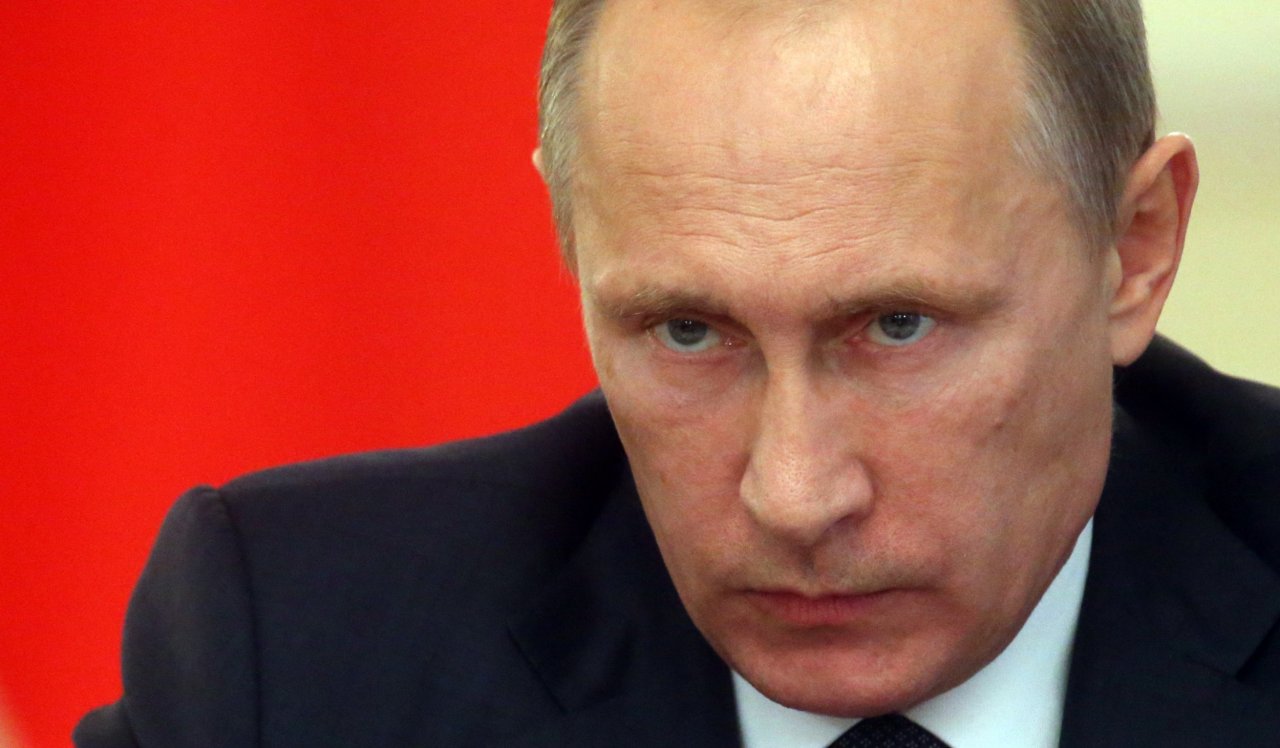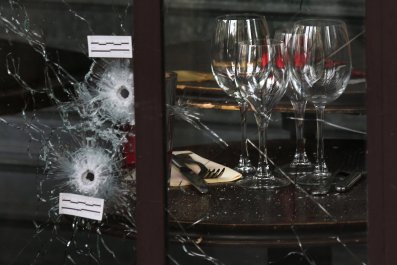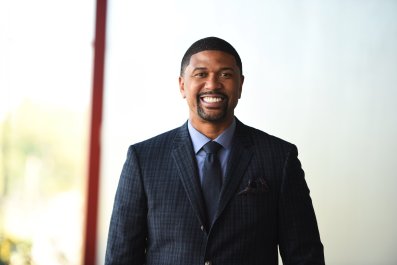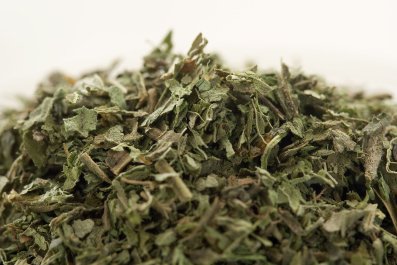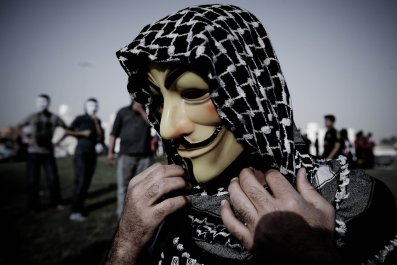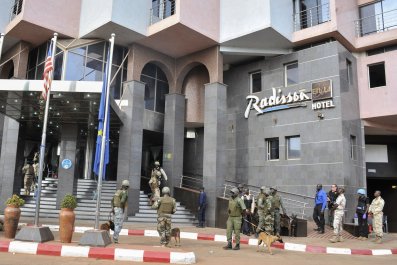Updated | In the days after the Paris attacks, Russian President Vladimir Putin was reported to have said, "To forgive the terrorists is up to God. But to send them to him is up to me." It turns out the quote was too good to be true—he didn't say it. But his practical response was no less blunt. The Russian air force kicked up the frequency of its airstrikes on ISIS positions in Syria to over 120 sorties a day and began using long-range Tu-95 strategic bombers, designed to carry nuclear payloads, to drop cruise missiles. The raids destroyed at least 500 trucks carrying smuggled oil—ISIS's financial lifeblood—as well as training camps, according to Russian Colonel General Andrei Kartapolov. And for the first time, the bombing was coordinated, on a basic level at least, with France and the U.S.
And so ISIS's attacks on Paris and on a Russian airliner in Egypt have succeeded where two months of talks have failed in uniting the old World War II allies against a common enemy. Even U.S. Secretary of State John Kerry seemed to acknowledge Russia's dramatic military and diplomatic intervention in Syria as a game-changer. He spoke of "a greater level of exchange of information" between Russia and the West, and of his hopes of a cease-fire between the forces of Syrian President Bashar al-Assad and the non-ISIS opposition "within the next three, four, five weeks.
"Iran, Russia [are] ready for a cease-fire. The United States [is] ready for cease-fire," said Kerry, who was in Paris to pay his respects to victims of the November 13 attacks. "The faster Russia and Iran can give life to [the political] process, the faster the violence can taper down."
Putin's journey from a pariah to an indispensable Middle East power broker has been startlingly fast—and driven by what looks like growing willingness among some Western powers to overlook the Russian leader's sins in Ukraine in the interest of destroying ISIS.
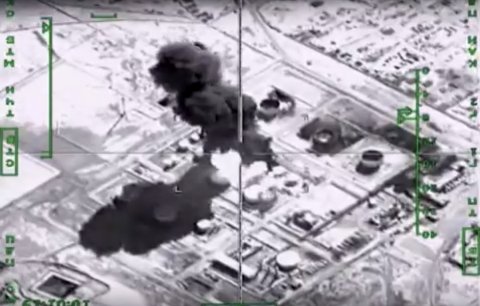
Russia's intervention has already had three dramatic effects. First, it has stopped the retreat of the beleaguered Syrian army and given the Assad regime a massive morale and military boost. Second, Moscow's full-court press on the diplomatic front has crystallized into a draft peace plan that calls for a cease-fire among all "moderate" opposition groups, while Islamist radicals of ISIS are destroyed, to be followed by nationwide elections (true, it's a peace plan that so far none of the combatants except the Assad regime support, and in the meantime Washington has stepped up its military suppor t of Syrian Kurds and other rebel groups). And third, Putin's foray into Syria has already generated grim blowback in the form of the bomb attack on a Russian passenger plane, claimed by ISIS, that killed 224 people.
But what is Russia's plan for getting from the current chaos to something like victory? And what does a victory look like for Russia?
"The first priority," says a senior Russian diplomat who works with his country's Middle East policy, "was saving the [Assad] regime from immediate collapse." Indeed, says this source, who requested anonymity when discussing his government's policy-making, the Russian deployment was precipitated by "an urgent visit" by a senior member of the Iranian Revolutionary Guard Corps to Moscow in August, who warned that the Syrian army was crumbling and that government positions would soon be overrun by opposition forces affiliated to the Free Syrian Army. Assad's troops were falling back along the key corridor of Syria's M5 roadway linking Damascus to Homs, Hama and northern Syria. Losing that could cut off the coastal heartland of Assad's Alawite sect from the capital. In September, Russian airstrikes against rebel groups in northeastern Syria—according to the U.S., 85 to 90 percent of them hitting "moderate" opposition groups rather than ISIS—stabilized the line. By mid-November, regime troops heavily supported by Russian air force bombers and Russian-made Mi-24 Hind helicopter gunships flown by Syrian pilots were able to break a two-year-long ISIS siege of Kweiris air base in Aleppo province.
Russia's—and the regime's—military strategy hinges on pushing that assault further. "This is all about Aleppo," says Joshua Landis, a Syria expert and former U.S. government adviser. "Russia is trying to help Assad gain as much territory to create a state that makes sense—that has to include Aleppo, a major port, and Idlib.… The Syrian leadership plans to take Aleppo in three months and in a year consolidate all of northwest Syria."
But most observers question whether the exhausted Syrian army, even with the backing of Russian air power and Iranian Revolutionary Guards soldiers and senior officers, can capture that much territory so quickly. Especially after so many years of military deadlock that has included desperate military measures by the Syrian army, such as dropping primitive but deadly barrel bombs from helicopters over densely populated areas of Aleppo and deploying sarin nerve gas against civilians in 2012.
Then there's the possibility that backers of the largely Sunni opposition in the region will ramp up their support to match Russia's. The most likely scenario, says Moscow-based military analyst Pavel Felgenhauer, is a "slow, parallel escalation…. If there are more successes by Assad's forces, the opposition will get help maybe in the form of direct intervention by the Turkish and Qatari air forces, or also more sophisticated anti-aircraft weapons such as Stinger or Avenger missiles that the Saudis have purchased from the U.S." For its strategy of bolstering the Assad regime to succeed militarily, "the Kremlin needs to convince the Qataris, the Saudis and the Turks not to arm the opposition, and also convince the West that Assad is the man who can restore security and stop the flow of refugees," says Landis. That will not be easy.
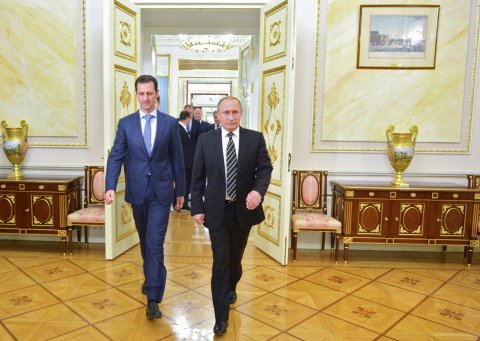
Assad or Who?
Ostensibly central to the diplomatic debate over Russia's new plan is Moscow's apparent insistence that Assad remain in power at least for 18 months while preparations are made for national elections to be held. An October trip by Assad to Moscow was his first known trip outside Syria for four years. He flew on a Russian military plane for a visit that appeared to be a strong personal endorsement of him by Putin.
But what is really important for Russia is keeping the Syrian state intact—and that means preserving the 45-year-old regime founded by Assad's father, Hafez, and based on the supremacy of the Alawite sect of Islam, a religious minority in its own country. "We are not saying that Assad should leave or stay," says the Russian diplomat, echoing public statements by foreign ministry spokeswoman Maria Zakharova. "It is up to the Syrian people to decide who rules them.… But what is unacceptable to us is getting rid of Assad and replacing him with anarchy. For the sake of the Syrian people, Russia will not accept another Iraq or Libya."
Yet Assad is now a toxic figure not only to the Syrian opposition. "A whole bunch of countries, including the United States, Saudi Arabia, the Emirates, Turkey, Qatar, Jordan, Egypt, Great Britain, Germany, France, Italy, most of Europe, dozens of countries, if not hundreds, understand that Assad creates an impossible dynamic for peace," Kerry told a meeting of states involved in the Syrian crisis in Vienna on October 29.
In practice, though, even prominent U.S. policymakers worry that Moscow is right: Deposing Assad immediately may lead to the collapse of Syria and a bloodbath. "Getting rid of Assad is a code word for scrapping the Alawite ascendancy," says Landis. "The concept the West has believed in for the last dozen years, that you can have regime change without destroying the state, is not borne out by facts on the ground. We saw this in Iraq—if you destroy the regime, you destroy the state too. Syria is a sectarian regime. All the big institutions—the army, the police—are populated from top to bottom with [Alawite] Assad supporters. If you put a Sunni on top, he would have to fire everyone underneath—not only for revenge but because he couldn't trust them."
As early as 2013, when the presence of Islamist extremist groups like the Nusra Front, an Al-Qaeda affiliate, became a major factor on the battlefield, some U.S. officials privately questioned the wisdom of the official U.S. position on removing Assad. A senior congressional official, who spoke on condition of anonymity to discuss sensitive information, confirms that the classified diplomatic cables he saw were "a lot less enthusiastic about the prospect of Assad's departure and a lot more concerned about who would replace him." In February 2014, Robert Ford, U.S. President Barack Obama's ambassador to Syria, resigned in protest over the administration's policy in that country.
At the same time, Russia acknowledges that in the long term a less divisive figure than Assad may have a better chance of producing a compromise. "There is a difference between the Iranians and the Russians," Khaled Khoja, president of the opposition Syrian National Council, told supporters before the Vienna conference. "The Russians need to enhance their influence whether Bashar al-Assad is in power or not. The Iranians are sticking with Bashar; they know no one else will give them the same benefits."
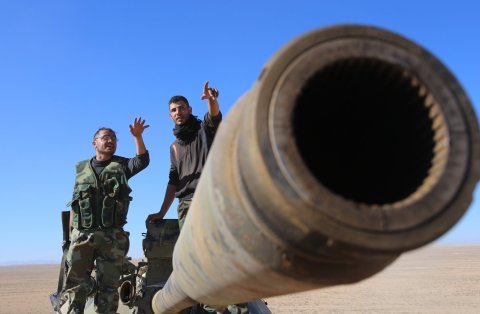
The problem for Moscow is finding a plausible replacement. Both the Russians and the U.S. have been seeking an "Assad Lite" for years. According to Ford, a current leading candidate is Colonel Suheil Hassan, regarded as the Syrian military's best field commander. Nicknamed Al Nimr , Arabic for "the Tiger," he led the successful offensive on Kweiris air base in November.
The Russians claim that "there are several people in our field of vision, on the political side, on the military side," according to the Russian diplomat, though he won't name names. "Our contacts with Syria go back decades. Hafez al-Assad learned to fly MiG fighters in the USSR. All their top officers trained with us. We know them all."
Veteran Syria hands in the U.S., though, are skeptical of such bluster. "Anyone who thinks that Russia knows Syria better than the U.S. is deluded," says Landis. "You can't just go down three positions and find a general who can jump up. They have been purged. They don't exist." Landis recalls a conversation with a Syrian brigadier general before the outbreak of the civil war about the prospects of anyone seizing power in Syria—as Hafez al-Assad did in a series of coups and purges in 1963, 1966 and 1971. "The general's answer was: 'The top 12 military figures in Syria all believe they could rule better than Assad. But could they stay in power? No.' The truth is that getting rid of Assad would be seen as a sign of weakness. The hawks in the region would tear down the whole Alawite infrastructure."
There is no sign that what Landis calls "the very predatory political culture" of Syria's ruling Alawite sect has softened over the past four years of war. After the fall of four regime military bases in September 2014 and the killing of 250 soldiers at Tabqa air base, Alawites came onto the streets in Homs to demand the resignation of the governor. Faced with this challenge to his authority, Assad dismissed his cousin Hafez Makhlouf as head of the internal branch of the General Security Directorate. Makhlouf and his brother Ihab were allowed to flee to Belarus with their families. Then, in April 2015, Assad ordered the arrest of another cousin, Munther al-Assad, for plotting against the regime. Intelligence chief Ali Mamlouk was placed under house arrest soon after, accused of plotting with Bashar al-Assad's exiled uncle Rifaat al-Assad to replace Bashar as president. Several other top military officers have also been reported arrested and liquidated since May, including the commanders of the Syrian army's 1st and 4th Armored Divisions, the chief of one major air base and the head of special forces. It's not known whether the officers were removed for failures in the field or for political crimes. But in any case, argues Landis, Russia's notion of a change of Syrian leadership by peaceful election is pie in the sky. "It's impossible for Alawites to carry out any kind of democratic procedure. That's a false notion of how this tribe works. Without Assad, all top Alawites would kill each other."
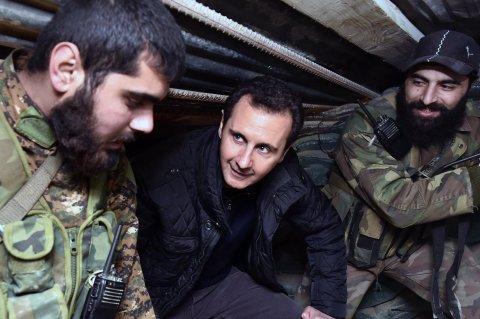
Sociopath or Psychopath
If Assad is the only option, what does that mean? Diplomats and journalists who have met him recently report that he seems to be in a state of profound denial. "President Assad and the people around him never doubted they would win," recalls a former U.N. envoy to Syria, Lakhdar Brahimi. "For them, the war was an aggression from outside." In a February interview with the BBC, Assad insisted that "the government and the state institutions are fulfilling their duty towards the Syrian people" and blamed the war on an "invasion of terrorists coming from abroad." He also denied the widely documented use of barrel bombs. Ambassador Ford said he found Assad gracious, soft-spoken and noticeably free of haughtiness, displaying a sense of humor and even making puns in his fluent English. But he was also quick to anger when pressed on Syria's human rights violations. Foreign Affairs magazine's managing editor, Jonathan Tepperman, who interviewed Assad in January, concluded that "either Syria's president is an extremely competent fabulist—in which case he's merely a sociopath—or he actually believes his lies, in which case he's something much more dangerous (like a delusional psychopath)."
Yet in Moscow in October, officials claim they found Assad "calm, lucid, very much in control," according to the Russian diplomatic source. During the visit Assad made important concessions. Crucially, he was told that he must agree to share power—and Russian air support—with moderate opposition groups that Russia could entice into a "counterterrorist coalition" to fight ISIS.
Since Assad's visit, Russian agents have been busy reaching out to his opponents on the ground even as they bomb them from the air. Mustafa Seijari, a commander of the Free Syrian Army, confirmed in late October that Russia had invited several of his group's leaders for talks. The aim is to find rebel leaders who are willing to make a deal to lay down their arms and participate in elections—while making it clear that groups that refuse the bargain would be mercilessly pounded by Russian bombs. It's a strategy that Russia pursued successfully in Chechnya in the early 2000s.
According to diplomatic sources in Moscow, Russia has drawn up a list of 38 potential opposition allies, including three former heads of the Syrian National Council: Hadi Bahra, Ahmad Moaz Khatib and Ahmad Jarba, and its current president, Khoja. Russian Foreign Minister Sergei Lavrov has also backed an 11-point "national project" proposed by defected regime General Manaf Tlass that sets out a roadmap toward a cease-fire and eventually a joint assault on ISIS.
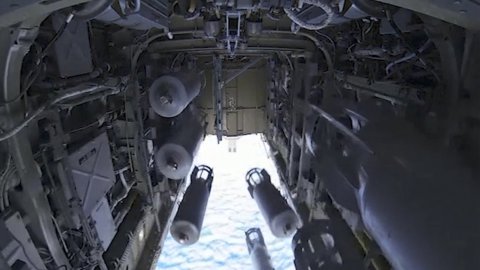
More important, Moscow has also been in regular contact with Assad's archenemies in the region. Immediately after Assad's departure, Putin spoke with the major Sunni leaders in the Gulf states and Jordan. Putin has also recently hosted Saudi Arabia's foreign minister and defense minister in Moscow. In other words, Putin seems keen to present himself as an honest broker to powerful Sunni states he cannot afford to alienate. In particular, Putin has been careful to reassure the Saudis that Russia's friendship with their main enemy, Iran, is not a new regional alliance. And though Putin traveled to Tehran on November 23, lingering suspicions between Moscow and Tehran run deep: Earlier in November, Major General Mohammad Ali Jafari, head of the Iranian Revolutionary Guard Corps, grumbled that Russia "may not care about Assad staying in power as much as we do."
Jafari is right. Russia is playing a diplomatic game that extends far beyond Syria. Unlike revolutionary Iran—or even America, with its ill-starred enthusiasm for regime change in the Middle East—Russia is essentially a status quo power. First and foremost, Moscow wants to preserve its economic and security interests in Syria and prevent the collapse of its last ally in the region. And while Turkey, Saudi Arabia, Jordan and Qatar would ideally like to see Assad gone and Iranians removed from Syria, Putin is hoping that a compromise may be possible. For instance, a scenario in which Russia rather than Iran emerges as the dominant outside power in Syria, with Assad staying on in a ceremonial capacity. That's the kind of deal the Russians believe that Saudi Arabia and its Sunni allies could live with—though so far Saudi Arabia has stuck to its firm line against Assad staying on.
The problem, warns Mark Galeotti, professor of global affairs at New York University, is that "modern wars tend to start well, with deceptive techno-thriller ease. The preplanned airstrikes, mapped in cockpit camera video.… They quickly tend to degenerate in messy ways that favor the desperate, the unpredictable, the insurgent and the unseen. With the Kremlin's new adventure in Syria, it is likely soon to find itself losing the initiative and faced with a series of dangerous and unpalatable options." Specifically, the numerous factions in Syria have been poisoned by the brutality of civil war and are very far from the kind of mutual understanding and forgiveness that underpins any peace process. By Landis's estimate, there are "1,500 militias in Syria, who all want to be ruler."
The Russian leadership "believes that most Syrians support Assad and that a minority are being oppressed by a small group of foreign-backed militants. They have been told that if you bomb the militants you can declare victory," argues Felgenhauer. "They totally misread and misunderstand the situation in the Middle East. They do not understand what they are doing."
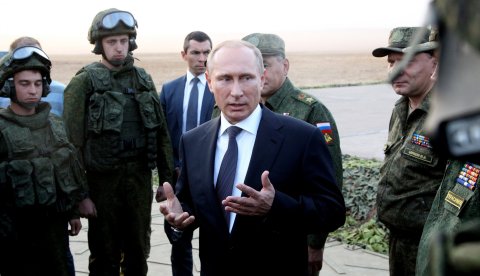
'We Were Feared'
But there's some deep background to Putin's swaggering belief that carefully applied ultraviolence can put the Middle East to rights. When four Russian diplomats were kidnapped by a team of masked gunmen as they drove out of the Soviet Embassy in Beirut on September 30, 1985, the USSR didn't bother with negotiations. The kidnappers were affiliated with the Iranian-backed group Hezbollah, so Colonel Yuri Perfilyev, the KGB's rezident, or station chief, in Beirut immediately sought out Grand Ayatollah Muhammad Fadlallah, the spiritual leader of Lebanon's Shiites. How unfortunate it would be if a Soviet nuclear missile happened to land on the Ayatollah Khomeini's residence in Tehran, or on the Iranian holy city of Qom, Perfilyev told the ayatollah. "The patience of a great power can run out," Perfilyev said, according to an account of the events he gave to Russian TV in 2001. "From waiting and observing, [the USSR] can proceed to serious action with unpredictable consequences."
"Fadlallah was left wondering, Are these crazy Russians really that crazy, to drop a bomb on Qom" recalls the Russian diplomatic source. "And then he thought, Wow, maybe they really are."
Soon after, a commando team from the KGB's elite Alpha Force arrived in Beirut. They tracked down a close relative of the hostage takers' leader, Imad "the Hyena" Mughniyeh, and kidnapped him, castrated him, then shot him in the head. Then the Soviets sent his severed body parts to Hezbollah headquarters, with a message that other relatives would be next.
"The kidnappers made a mistake," says the diplomat. "They were not dealing with nice Americans who wanted to teach the world to sing.… They were dealing with the USSR. They were dealing with the KGB. And the KGB were even more violent motherfuckers than Hezbollah."
At the time, Hezbollah had just murdered kidnapped CIA Beirut Station Chief William Francis Buckley after five months of desperate negotiations. Now, it seemed, the USSR was caught in the same nightmare. But no. Just two days after the Alpha operation, the three surviving Soviet hostages were released. No Russian citizens have been kidnapped in the Middle East since.
For Russian policy makers, especially KGB veterans like Putin who grew up on stories of Perfilyev's heroic showdown with Hezbollah, one thing remains the same—the conviction that Russians know better than Americans how to deal with terrorists. And that Moscow has a special knack for dealing with Middle Eastern politics.
Beirut showed "the way the Soviets operate," wrote historian Benny Morris, The Jerusalem Post 's diplomatic correspondent at the time. "They do things—they don't talk. And this is the language the Hezbollah understands." Or as the Russian diplomat puts it: "Say 'Beirut' in a company of [foreign service] veterans, and they will all smile and raise a toast—'Those were the days,' they say. 'We were strong. We were respected. We were feared.'"
It's easy to see how the Bondian cocktail of ultraviolence and cool professionalism, with a dash of casual nuclear brinkmanship, that Perfilyev dealt out to Hezbollah in 1985 appeals to later generations of Russian Middle East hands. But in fairness, Putin's plan for Syria is more than mere posturing. The reasoning, as Putin told the United Nations in September, is clear enough. America's botched focus on regime change in the Middle East produced nothing but the "destruction of national institutions" and created a power vacuum, "which immediately began to be filled with extremists and terrorists." Russia's intervention was to prevent the kind of anarchy that followed the fall of Saddam Hussein and Muammar el-Qaddafi by "preserving a functioning Syrian state."
True, Putin's cease-fire plan requires all players from Iran to the U.S. and Saudi Arabia to adjust their expectations. And it requires the West to swallow Assad's own logic that it is preferable to keep a bloody dictator in power—for a while at least—than to tolerate the continued existence of ISIS. But as the reality of ISIS's ambitions comes home to Moscow and Paris, Putin might just have the only viable plan around.
With Jonathan Broder in Washington
Correction: This story originally wrongly attributed the quote in the first paragraph to Putin. He did not say, "To forgive the terrorists is up to God. But to send them to him is up to me."



